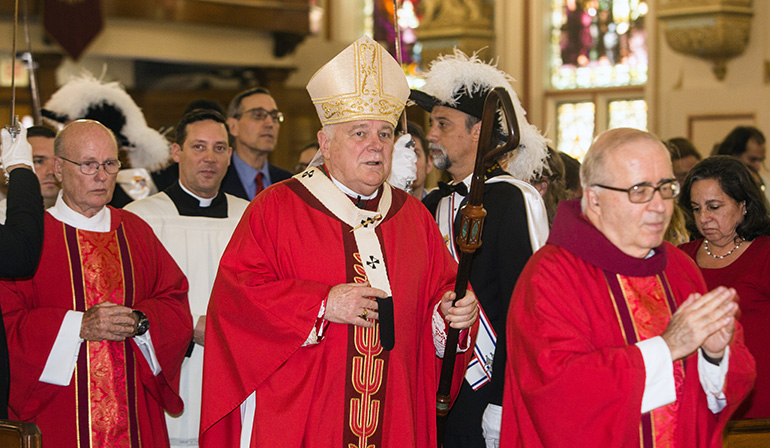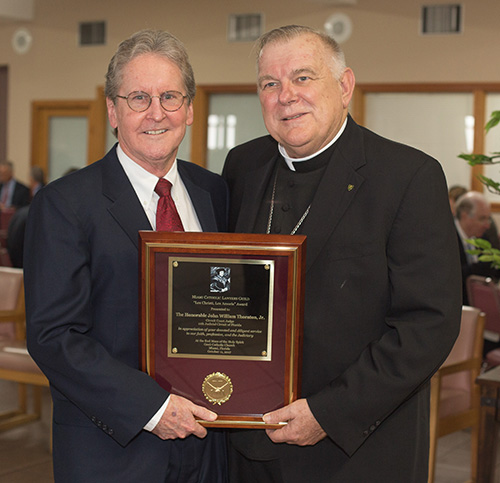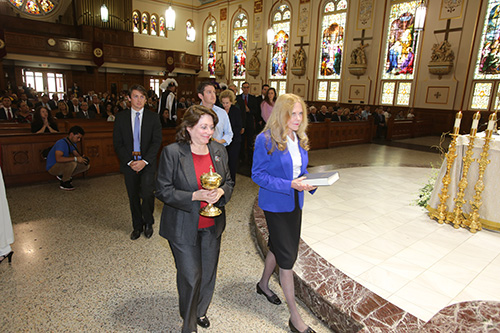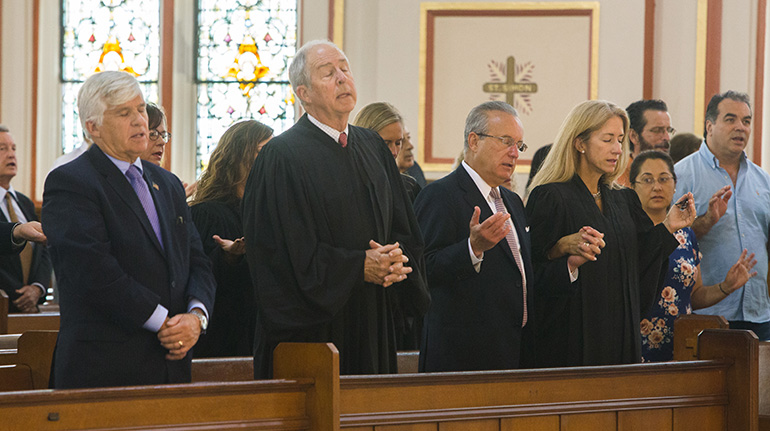By Marlene Quaroni - Florida Catholic

Photographer: MARLENE QUARONI | FC
Archbishop Thomas Wenski follows Jesuit Father Eduardo Alvarez, Gesu's pastor, into the church at the start of the Red Mass.

Photographer: MARLENE QUARONI | FC
Archbishop Thomas Wenski poses for a photo with Circuit Judge John W. Thornton, Jr., recipient of the Miami Catholic Lawyers Guild 2017 Lex Christi, Lex Amoris award.
MIAMI | Judge John W. Thornton, Jr.’s faith is a big part of his legal profession.
“John, through his actions, practices what he preaches,” said U.S. District Court Judge Federico Moreno as he presented the judge with the Miami Catholic Lawyers Guild highest honor, its 2017 Lex Christi, Lex Amoris award.
The presentation took place during the guild’s annual Red Mass of the Holy Spirit, celebrated Oct. 11 at Gesu Church.
Moreno cited Thornton’s volunteer work as chairman of the Camillus Health Concern, president of the Florida Bar Foundation, and chairman of the Legal Services for the Poor Committee.
“These are acts unknown to many,” Moreno said, noting that Thornton doesn’t do them for their “resume value, but because he actually lives his faith as a practicing Catholic. I compliment the Catholic Lawyers Guild for selecting Judge Thornton and many others who practice their faith not just with words, but with acts.”
Thornton thanked his family and colleagues for supporting him.
“I know you’ll agree with what I’m about to say,” he told the congregation. “I love being a judge, because it allows me to do the right thing, for the right reason, every day. Lex Christi, Lex Amoris, law of Christ, law of love. Christ said love God, love your neighbor. I will always treasure this award.”
Judge Thornton, 64, received a bachelor’s degree from the University of Notre Dame and a Juris Doctor degree from the University of Miami, where he was a member of the Iron Arrow Honor Society. He served as an assistant state attorney until 1980, when he founded the law firm of Thornton and Rothman. Former Florida Gov. Charlie Crist appointed him to be a circuit court judge in 2007. The Florida Judicial Nominating Committee in 2008 recommended him and three others to fill two vacancies on the federal court.

Photographer: MARLENE QUARONI | FC
Family members of Circuit Judge John W. Thornton, Jr., the 2017 Lex Christi, Lex Amoris awardee, bring up the offertory at the Red Mass, from left: his sister, Jane Thornton, his wife, Mindy Thornton, and his sons, Ryan and David Thornton.
Archbishop Thomas Wenski celebrated the Red Mass with Gesu’s pastor, Jesuit Father Eduardo Alvarez. In his homily, the archbishop drew a distinction between actions that are malum in se, or naturally wrong, such as murder, theft, and rape, and actions that are malum in phohibitum, or wrong because they violate a particular law, such as turning right on red.
“Yet many, many people � and this includes some revered members of our courts � no longer hold that there is anything ‘malum in se’,” the archbishop said, citing what Pope Benedict called “the dictatorship of relativism.”
Natural law has been set aside, and “it is the ‘ego’, the ‘I’ and its whims that is the ultimate measure,” Archbishop Wenski said. “But this ultimately leads to a dead end � and to some real confusion.”
That confusion is evident in the case of “illegal” immigrants, he noted, who are called “criminals” in many discussions not because they have broken some natural law but because they have violated a government policy, which in most cases is not even a criminal offense.
“‘Illegal’ immigrants are ‘criminals’ only because government policy declares them to be or treats them as such � in the same way that persons openly practicing Christianity or Judaism in Soviet Russia were ‘criminals’ only because government policy declared them to be,” Archbishop Wenski said. “And conversely if government policy determines that something is ‘legal,’ like abortion, then the current conventional wisdom is ‘if it's legal it can't be wrong’.”
The archbishop recalled his visit to the U.S. Capitol in September 2015, when he heard Pope Francis address a joint session of Congress. Several reliefs of notable persons are enshrined on the walls in the chamber’s upper gallery, among them the great law-giver, Moses.
The archbishop quoted Pope Francis’ words to the legislators: “The figure of Moses leads us directly to God and thus to the transcendent dignity of the human being. Moses provides us with a good synthesis of your work: you are asked to protect, by means of the law, the image and likeness fashioned by God on every human face.”
ABOUT THE RED MASS
- The Red Mass is a historical tradition in the Catholic Church dating back to the 13th century, when it officially opened the term of the court for most European countries.
- Government officials and judges would proceed into church clothed in red garments, signifying the fire of the Holy Spirit, whose guidance they needed to mete out justice.
- The tradition was introduced in the U.S. in 1928 and continues today for legal professionals and law students.
- The Miami Catholic Lawyers Guild fosters spiritual growth and fellowship among its members.

Photographer: MARLENE QUARONI | FC
From left: Judge Federico Moreno, Judge Vance Salter, and George Mencio, with his wife, Judge Cecilia Altonaga, pray the Our Father during the Red Mass.

